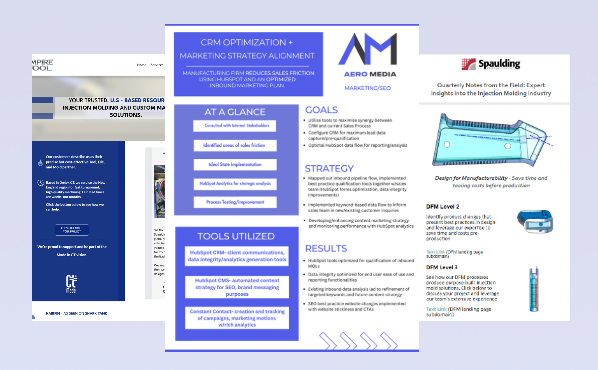Our Portfolio of Work
Precision marketing. Powerful growth. Here you’ll find insights and examples from work with our partners, as well as our methods to achieving success together.

Aero’s Approach
Objectives
Challenges



Featured Case Study
From current to ideal state –
“Molding” technology to fit the sales process
At a Glance
– Consulted with internal stakeholders
– Defined Ideal State implementation
– Identified areas of sales friction
– Process testing/continuous improvement
– HubSpot automation/data reports established
The Objectives
Maximize ROI of HubSpot Sales Software by making it work for the end-user, not the other way around
Increase the amount of info coming in with inbound leads and automate as much of the qualification process as possible
Establish pipeline reporting for inbound lead origin sources- create a clear picture of where the most valuable interactions are coming from
The Challenge:
Inbound leads coming into one “bucket” without being sorted by inquiry
Sales team unable to easily access and be notified of inbound leads
Inbound leads coming in with little information or inquiry details, thus leading to a turbulent qualification process
Our Approach:
Determine “ideal state” of where inbound leads flow to inform creation of automation workflows, sending leads to sales resources based on keywords in inquiry
Enhance contact form data capture – providing sales team with as much data as possible for quick and informed lead response.
Receive feedback directly from Sales team on function and impact, positive and negative, on interactions with inbound leads. Design automation workflows with end user (sales resources) in mind.
Project Reflections:
HubSpot ROI can increase exponentially when configured to match the sales team it services. This is done through careful automation and consistent dialogues with a Sales Team to figure out what functions enable them, and tailoring the processes and systems around the team’s insights.
Striking the right balance between asking for too much or too little information from a lead is essential- with minimal info, the sales process starts with a degree of uncertainty, hindering the development of a good conversation. Too many questions can deter potential leads. Therefore, focusing on a few crucial data points makes the inquiry process easier for both the lead and the sales team.
CRM and Marketing Automation can either be a force multiplier or a force divider, and a one-size-fits-all configuration is never the solution, because every sales team and process is different. Coordination between Sales and Marketing on building out the processes and functions of a CRM is always beneficial, and viewing CRM and marketing automation as specialized tools for sales enablement generates better experiences for sales teams and their clients.

